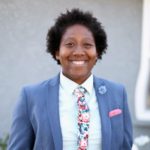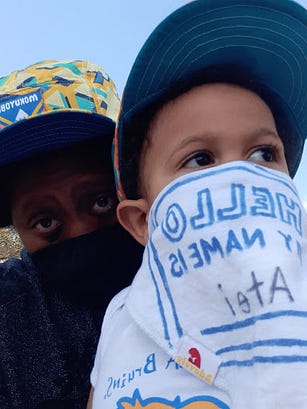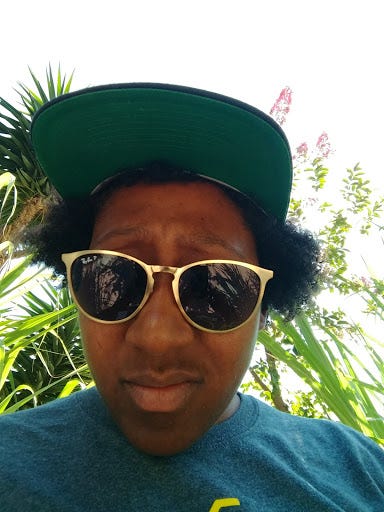Not Interested in Your New or Old Normal: This Shouldn’t Be Normal

Tamika L. Butler
Tamika L. Butler, Esq. is a land use, equity, environmental and social and racial justice advocate. She is the Principal at Tamika L. Butler Consulting.

Doing our part as a family to adjust
This is really hard. Not just trying-to-think-of-the-last-time-a-whole episode-of-Saturday-Night-Live-was-good hard. Not just trying-to-remember-the-last-time-a-Drake-song-was-fire-except-as-a-viral-Tik-Tok-dance-craze hard. Not just trying-to-have-just-one-more-bite-and-then-realizing-you-ate-all-the-damn-ice-cream hard.
It’s a whole different kind of hard.
Often when I’m dealing with anxiety, stress, and depression, I try to write. I try to put the things in my head down on paper. My wife and I were doing that by writing one another a short note every night. We decided that we’d remember this time — our fears, the things we were grateful for, and the stresses that the unknown brought to us — through our shared COVID log. We started to share what the days were like and the things we wanted to remember, like the cute way our son spontaneously started saying, “thank you, mommy” and does a little dance when he’s overcome with happiness. Things that stress us out to no end like the drains that seemed clogged and the windows that seemed to leak all of a sudden (we leave out how they’ve been that way for months, but we’ve been putting it off until next weekend for lots of weekends). Or the things that are our pleasant escapes like Tiger King…until they aren’t because they remind us that exploitation and privilege looking down on poverty is more than just a guilty pleasure, but a way of life in this society. But the COVID logs ended a few days ago when we both realized that trying to fit in all the work and all the parenting and a minute or two for ourselves or our relationship (not both) meant we had an impossible schedule with not enough hours in the day. That schedule of waking up at 4:30 every morning and going to bed after midnight every night simply meant we were too tired to do something so non-essential.
“One must be willing to assess the problem honestly, deeply, and thoughtfully — even when it reveals things in ourselves and in our society that make us profoundly uncomfortable.”
Speaking of which, this hard place we’re currently all in is teaching a lot of people new ways to look at old words like “essential” and “normal.” In this “new normal,” we’re supposed to be focused on staying home, staying healthy, washing our hands, and only going places that are essential, staffed by people who are essential, when it’s essential. But more than anything, we’re all being told to adjust to some new normal that involves asking people to do more than just work from home. What we’re actually being asked to do is work from home during a pandemic like many of us have never seen and that may be followed by waves of sickness, that may be followed by a depression, that will definitely be followed by many people suffering from depression, that will definitely include the death of someone we know closely or tangentially, that will definitely include your kids popping up right when you started concentrating, that might include eating a whole bag of chips in one sitting but forgetting to eat lunch, that won’t include drinking enough water, that will include feeling fear every time you have an allergy attack now that nature is thriving, and that might include having a panic attack about what to do when your home doesn’t feel safe for shelter, or when you don’t have shelter or when you do but got laid off and can’t pay rent so might lose that shelter.
I mean, you get it. This new normal is awesome.

Awesome Face
We should all just adjust. That seems easy enough. That seems like something that we can normalize through Zoom meetings (racist bombings be damned) and Instacart orders (safety and health of employees who aren’t called employees be damned). Don’t get me wrong. In this “new normal” I am on Zoom or ordering things from various insta services daily. I’m also keenly aware that there are people getting rich off of this crisis and that the people getting squeezed in the middle — those just trying to make an honest living so they don’t get evicted and end up unhoused or so their small business can survive — might not be so ready to normalize something that is only amplifying the disparities and inequities they already knew about intimately and lived with daily.
Which is what’s been sitting with me in such an awful way. This situation may be teaching us new ways to define old words. But it’s also teaching us new ways to preserve the old normal. What I want to know is: Is it teaching us new ways to look at old problems? I want to say yes, but I’m not convinced. The reason I’m not convinced is because to look at old problems in new ways, one must be willing to assess the problem honestly, deeply, and thoughtfully — even when it reveals things in ourselves and in our society that make us profoundly uncomfortable.
The last time we were in a recession, I was graduating from law school. I walked out of an elite institution with a law degree and I was literally my ancestors’ wildest dreams.

Grandma stuntin’ for graduation
I felt like I had reached my pinnacle of privilege. Despite my extreme privilege, I never forgot why I went to Stanford in the first place. I wanted to help people. My people. During a fellowship at Legal Aid Society-Employment Law Center, I got to be unapologetically black each and every day while starting a legal clinic to help Black workers in the Black parts of San Francisco where the tech industry was already emphasizing the haves and have nots. In that work, we had no choice but to center people at the intersections of ability, race, gender, national origin, status (immigration, HIV, you name it), and every other protected class. We knew that the recession was a moment in time, but that the vestiges of colonialism, white supremacy, and racism are timeless. These things made whatever the majority were experiencing as temporary seem permanent and intentional for those already confronting structural oppression daily.
Now, like then, I frequently hear “we will get through this.” This is the new normal, but it shall pass and then things will get back to old normal. I’m sorry. That sounds just like Make America Great Again to me. Normal for whom? Great for whom? People who meltdown and rant about how they do everything perfectly? People whose response to dissent is defensiveness and fragility?
It’s hard for me to believe that when we get back to normal everyone will feel much better. Who is going to feel better? The people being harassed for trying to get some fresh air because as an interracial gay couple they look like two friends breaking social distancing rules, not partners? The unhoused folks being kept from grocery stores because they don’t have masks, even though we refuse to invest in adequate resources to make a dent in what’s needed on Skid Rows across this country? The student being told to make sure they participate in online learning so they don’t get behind despite being a victim of the digital divide and not privy to the benefits of fast WiFi or any internet at all? The 65-year-old delivery driver with underlying health issues working for some company that refuses to provide her with what she needs to feel safe — let alone benefits? The renters who have no protection from evictions, or the families who depend on that rent? What about the doctors drowning in educational debt, who are forced to potentially say goodbye to their loved ones as they go to work without proper equipment just to help try to save others? The street vendors who have been feeding us all for years without the policies in place to ensure they can thrive and build the lives we say this country and our dream promises? And what about the Black folks who continue to die at higher rates much to the surprise and awe of so many who can’t figure out what about the Black experience in America puts us at a higher risk…for…COVID-19…I mean, everything?
The reality is, I don’t want to get back to normal because just being better than it is now shouldn’t be enough. As a Black person in this country, I knew that the old normal meant my life was expendable. Look at the stats. As a Black person in this country, I also know that in this new normal my life is expendable. And honestly, nothing has been said or done by folks in power to make me believe otherwise. Bringing some Black person (or other nonwhite person) out to co-sign whatever they are putting forth (regardless of whether that person is a health expert or not; policy expert or not; expert on anything or not) doesn’t tell me that they are even thinking about my life or the lives of my people other than how we can help them get back to normally making their money.
This frustration is something that so many of us nonwhite folks feel. We’ve been talking to our therapists, reaching out to our friends, and creating virtual healing spaces to hold one another in this time. So many folks hear our concerns about the racism that will outlive this pandemic and keep asking what they can do to help. Start with joining the conversation, seeking understanding of our anxiety, and having the urgency that nonwhite people feel about how we ensure that we just don’t rush back to normal. Start by asking what normal is and for whom? Start by realizing that so much of what makes this pandemic so tough was already in existence. Then ask why? Is that normal?
Ms. Butler’s new piece on “Confronting Power and Privilege” and additional writings are available at medium.com/@connectwithtamika.





